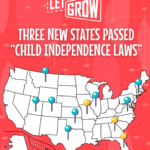






Life360 and the Severed Head Issue
The worry that our kids will die the second they step outside feels innate, but it has been cultivated.
Did you catch the new ad for the Life360 tracking app? It features a mom singing a Disney-sweet song to her daughter who looks to be high school age:
You are my whole wide world
My heart, my joy, my baby girl
You’ll never know how much I love you!
When you’re gone I just think of you…
Dying.
The girl reacts the way you probably just did: “WHAT???”
Kidnapping! Wood-chipping! Organ-snatching! Road-tripping! The mom sings all the ways her daughter could die, each with a cartoon visual of bloody, severed organs, limbs, and heads. SUCH A LOT of severed heads.
And such a perfect example of how our culture is driving parents crazy.
Teaching parents to catastrophize.
Did you actually think your kid could survive a walk to school? Get with the program, mama! Indulge in your very worst fantasies, like this lady. It’s fun! It’s normal! Heck — here’s a handy list! Your kid could be thrown into a trunk, or shoved into an oven. This is just what nice moms naturally think about. Sing about!
And while we’re at it, viewers: Don’t bother learning to COPE when you’re separated from your kids. That’s too hard! You love them too much! If you can’t be WITH them every single second (alas!), at least make sure you can WATCH them every single second. Because otherwise…
Woodchippers.
The power of fear.
At this point, most of us above age 30 can still remember growing up without our parents knowing where we were every second. We waved goodbye and somehow they didn’t have a nervous breakdown. They trusted us to go places, deal with minor problems, even wait at the bus stop without them, if you can imagine. This trust also allowed them to chill.
But fear sells. So even though the crime rate today is LOWER than when most of us were kids (lower against kids AND grownups), today’s parents have grown up on a steady diet of doom. Some of this came from Law & Order. Some from local news, always chasing crime. And some came from the tsunami of “safety products” that amp up remote dangers in order to sell us the antidote.
The result is parents so force-fed fear that they can’t let their kids do almost anything on their own. A University of Michigan study found that the majority of parents of kids age 9-11 won’t even let them play at the park with a friend, or trick or treat. Only 50% let them leave their side at the store to venture to another aisle. Tweens are the new toddlers.
As a result, parents are stuck always watching their kids. And kids are stuck always being watched. That’s not only unnecessary, it’s driving both generations nuts.
Worst-First Thinking.
An ad like Life360’s normalizes what I call “Worst-First Thinking” – thinking up the WORST case scenario FIRST and proceeding as if it’s likely to happen. And THAT is what normalizes helicopter parenting.
The daughter in the ad, stunned by her mother’s diarrhea of dysfunction, comes up with solution: Okay, mom. From now on you can track my every move. I’ll just sacrifice my growing autonomy because you can’t deal with your neurosis. (She doesn’t use those exact words.)
To check is to calm: The big lie.
But the thing is, that solution doesn’t even work. The more that you give into anxiety, the more powerful it becomes. So while many of the commenters on YouTube loved the ad — “Hilarious!” “THAT’S ME!” “Feel so seen!” — I’m with @kellilarson3372, who wrote:
I’m sorry, but am I the only one who thinks this is insane? Yes, most parents have irrational fears about something happening to their kids. Totally normal. But Life 360 is monetizing on those fears, and implying that using this app and tracking your kid constantly is the answer to quelling those fears. That’s not how the body works, and that’s not how we heal from a fearful spirit.
That commenter is right. In fact, the psychologists I showed this ad to said that enabling obsessive behavior keeps a person from ever getting better.
How to worry more.
“My god — I don’t even know where to start,” said Long Island University Prof. of Psychology Camilo Ortiz, the father of Independence Therapy, watching the ad. “It goes contrary to everything we know about how to deal with anxiety in a healthy way.”
Psychologist Laura Kastner, a professor at the University of Washington Medical School and author of “Getting to Calm,” agreed. The healthy way to deal with anxiety, she said, is to push through it. If you sit with the discomfort, it loses its grip. This is known as exposure therapy: You get exposed to what you’re afraid of and gradually realize you can deal.
The circular trap.
The opposite is to “accommodate” a fear or anxiety by giving in to it, says Kastner. For instance, by checking a tracking app to see if your kid has just been decapitated. (And there isn’t even a special decapitating notification, so good luck with that.)
Encouraging a parent to keep making sure their child isn’t dead is “a trap,” say Ortiz, “because it deprives the person of learning to tolerate the anxiety.” And what happens to the kids of anxious parents?
Let’s just say that anxiety can be contagious.
But so can courage.
Oh, the irony!
Last December I interviewed Life360’s inventor and CEO, Chris Hulls. He told me that when he was growing up, here in America, he went to an event where he somehow met a Massai warrior who’d converted to Christianity. The warrior invited him to come to Kenya. So Hulls did – for the summer, on his own, with his parents’ blessing.
He was 11.
“I was on a thousand acres in the middle of nowhere, completely unreachable. The kids had never seen a white kid before. They gave me, like, a spear to go try to kill zebras,” Hulls recalled. (He didn’t succeed – they killed one for him.)
That summer, “I talked to my parents two or three times. They could not have been able to find me if they wanted to.”
Where real confidence comes from.
He sounded proud of his independence, his bravery – and his parents’ trust in him. My guess is his parents were pretty proud, too.
As for the app he went on to invent, which now has 83 million users and is valued at $3.5 billion, Hulls said, “We try not to be fearmongering.”
Maybe it’s time to try a little harder.



Comments are closed for this article.